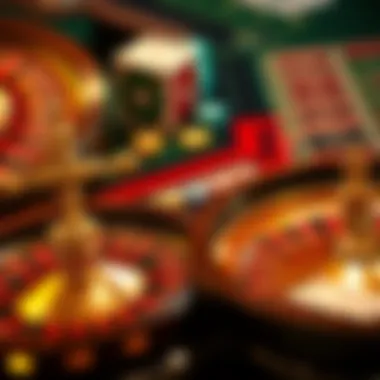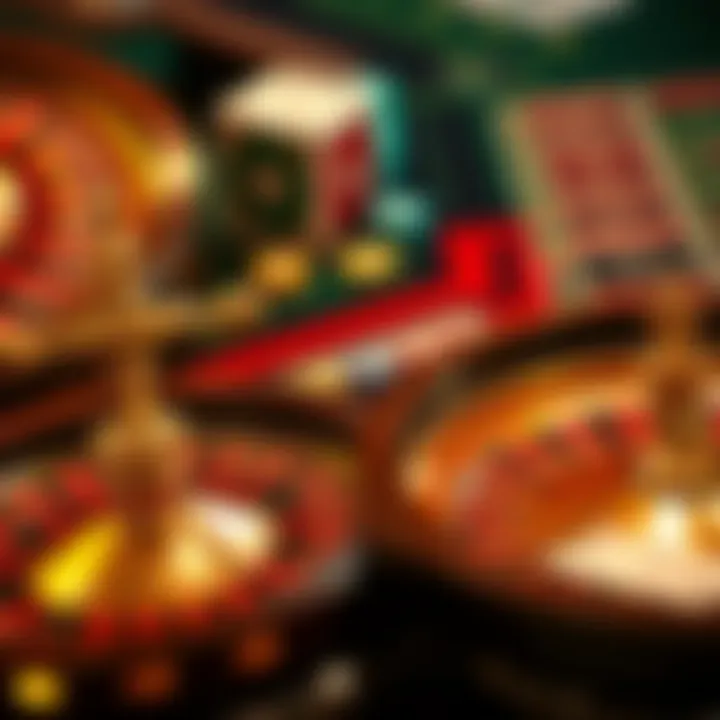Master Roulette: Strategies to Boost Your Winning Odds


Intro
Roulette has long captivated gamblers around the globe. The thrill of the spinning wheel, the anticipation of the ball landing, and the camaraderie of fellow players create an electrifying atmosphere in casinos. At first glance, it may seem like just a game of chance, but those who dig deeper discover layers that can be navigated—offering strategies and insights that can tilt the odds slightly in their favor. This article seeks to elucidate those strategies, breaking down the game’s mechanics, exploring distinct betting systems, and examining the ever-present tension between luck and skill. By understanding these concepts, both novice and seasoned players can approach roulette with a more informed mindset, potentially enhancing their experience and outcomes.
Game Reviews
Roulette is not merely a game of numbers; it's an experience that varies across different platforms and establishments. With that in mind, let’s delve into an in-depth analysis of some popular roulette varieties and explore any recent innovations in the game.
In-Depth Analysis of Popular Games
There are primarily two flavors of roulette—American and European. American Roulette includes an extra double zero, making the house edge slightly broader at about 5.26%. The layout is more complex, often intimidating for newbies who might prefer the tantalizing simplicity of the European version, with a single zero and a house edge closer to 2.7%.
French Roulette takes these foundational concepts and adds some twists, like the "La Partage" rule, which permits players to reclaim half of their stake if the ball lands on zero. This adjustment further enhances the player’s odds.
- American Roulette
- European Roulette
- French Roulette
- House Edge: 5.26%
- Features: Double zero, complex layout.
- House Edge: 2.7%
- Features: Simplicity, single zero.
- House Edge: 2.7% (with La Partage)
- Features: Unique rules to lower risk.
Understanding these variations can help players choose which version aligns with their preferences and risk tolerance.
New Game Releases and Features
The online casino industry has witnessed a surge in creative adaptations of roulette. Developers are tinkering with the basic format—introducing options like Lightning Roulette, which incorporates randomly generated multipliers to enhance payouts. The evolution doesn't stop there; Virtual Reality Roulette creates an immersive experience that attempts to replicate the casino atmosphere in the comfort of your home.
These innovations ensure that players have an array of options tailored to suit various gameplay preferences, often making it easier to choose a gambling environment that keeps the excitement alive.
Gambling Strategies
Roulette offers a playground for strategic minds. While betting systems don’t guarantee success, they can provide structures within which players may operate. Here’s an exploration of effective strategies that will benefit both beginners and experienced players.
Effective Betting Strategies for Beginners
For those just finding their feet in the world of roulette, starting with simpler methods is wise. The Martingale system is a frequently discussed strategy where players double their bets after each loss, hoping to recoup their losses with a single win. Important to remember, this system works best with a substantial bankroll and does carry significant risk due to table limits.
Alternative approaches include the D’Alembert system, which involves increasing your stake by one unit after a loss and decreasing by one unit after a win. This method is less aggressive than Martingale and might suit those looking for a softer landing.
- Martingale System
- D’Alembert System
- Method: Double after losses
- Risk: High capital needed and table limits.
- Method: Increase/decrease by one unit
- Risk: More balanced approach.
Advanced Techniques for Seasoned Players
For players who have mastered the fundamentals, exploring advanced betting systems can be a fascinating endeavor. The Fibonacci system, for instance, is a more structured approach based on the famous sequence of numbers. Players bet following this sequence, increasing their bets by following Fibonacci numbers after losses.
Another advanced strategy involves sector betting, where players rely on combinations of numbers clustered on the wheel itself, betting on specific sectors rather than individual numbers. This method can cater to players looking to blend luck with a more calculated approach, allowing for a deeper level of strategic play.
- Fibonacci System
- Sector Betting
- Method: Bet based on Fibonacci sequence
- Advantage: Structured betting.
- Method: Focus on number clusters
- Advantage: Combines luck with strategy.
Understanding Roulette Mechanics
Understanding how roulette works is crucial for anyone looking to improve their game. Knowledge of the mechanics, history, types of roulette, and how the game is played lays the foundation for effective strategies. Roulette isn't just about luck; it requires a solid grasp of various elements that collectively influence the game's dynamics. The mechanics involved can guide players toward wiser betting decisions and help them navigate the pitfalls that many get caught up in.
The History of Roulette
Roulette has a rich history that dates back to the 18th century. Originating in France, its name translates to "little wheel," referencing the wheel used in the game. The game is believed to have evolved from earlier games like "Roly-Poly" and "Even-Odd." The first known mention of roulette appeared in a book by Blaise Pascal, who was searching for a perpetual motion machine. Over time, roulette made its way to casinos around the globe, adapting to cultures and regulations. The excitement surrounding roulette has not faded; it remains one of the most popular games in casinos today.


Types of Roulette
When it comes to playing roulette, knowing the type of game can significantly impact your experience. There are three main varieties:
American Roulette
American Roulette features a wheel with 38 slots: numbers 1-36, a 0, and a 00. The main characteristic that sets it apart is that double-zero (00) which increases the house edge. This means players face a slightly worse chance of winning compared to other types. While it can be an attractive choice for some with its accessibility in many casinos, it’s essential to recognize that the added 00 can make winning less likely. Some players enjoy betting on this version for the thrill it brings, but caution is advised due to the elevated house edge.
European Roulette
European Roulette simplifies things a bit by having only 37 slots: numbers 1-36 and a single 0. This single zero reduces the house edge compared to its American counterpart. Many experts recommend this version for those keen on maximizing their chances, as it offers better odds. The unique feature of the European version is the La Partage rule, which allows players to recover half their stake on even-money bets if the ball lands on 0. This can be beneficial for seasoned players navigating their betting tactics.
French Roulette
French Roulette is often seen as the most elegant of the three. It features the same wheel layout as European roulette but adds additional rules like La Partage and En Prison, which protect bets further. This means players can either recover or place their bets in a sort of "prison" for the next spin, giving them a second chance. For risk-averse gamblers, French Roulette can be a solid option due to these rules that lower the overall house edge. However, the complexity of the rules can also be a hurdle for newcomers.
How the Game Works
To truly grasp roulette, one must understand the game’s mechanics. This includes the roulette wheel layout, the betting options available, and how the house edge influences each bet.
Roulette Wheel Layout
The layout of the roulette wheel comprises alternating red and black numbers, with green designated for the 0 and 00 in American roulette. The arrangement is such that no two consecutive numbers share a color, creating an appealing visual and adding to the game's intrigue. Understanding this layout can assist players in formulating strategies based on their betting habits. In practice, this layout provides players with clear and distinct betting opportunities, depending on how they want to wager.
Betting Options and Payouts
Players can place a variety of bets in roulette, ranging from individual numbers to broader categories such as colors or odds/evens. The range of bets allows players greater flexibility, but it’s important to recognize the different payouts associated with these bets. For instance, betting on a single number yields the highest payout of 35 to 1, while betting on a color results in a 1 to 1 payout. Familiarizing oneself with these options can enhance strategic decision-making and direct focus on more suitable bets for one’s playing style.
House Edge in Roulette
Every type of roulette has its house edge. The house edge represents the casino's built-in advantage, calculated based on the game type and its respective rules. In American Roulette, the house edge stands at about 5.26%, while European and French Roulette boasts a lower house edge of approximately 2.70%. This difference is crucial for players to consider as it ultimately affects potential wins. Knowing the house edge can guide gamblers towards wiser choices, maximally leveraging their bankroll by opting for games with lower house edges.
Analyzing Betting Strategies
Understanding different betting strategies is crucial for anyone looking to navigate the world of roulette effectively. The game, primarily seen as a chance-based endeavor, can benefit from a more tactical approach. Each strategy offers its own rhythm and flow, giving players a chance to adapt their wagering habits according to specific situations. An analysis of these systems reveals how players may attempt to stretch their bankroll, minimize losses, and even increase their chances of a payout. Ultimately, these strategies blend the notions of calculated risk and psychological resilience, forming a solid foundation for decision-making at the roulette table.
Flat Betting System
The flat betting system is one of the simplest strategies available. In this method, players choose a fixed amount to wager on every spin, regardless of whether they win or lose.
- Pros: The primary advantage is the straightforwardness; it allows for easy tracking of losses and wins, making it accessible for both novices and seasoned players. It's also a gentle approach to bankroll management, as players do not risk large sums.
- Cons: However, this method does come with its pitfalls. Since the bets are consistent, it doesn’t exploit winning streaks, which means that it can prove to be less effective during long runs of losses. Players may find their bankroll dwindling without any significant gains.
Martingale System
The Martingale system is a well-known method that relies on betting double the previous bet after every loss. This approach rests on the assumption that eventually, a win will occur, allowing one to recover all previous losses plus a profit equal to the original wager.
- Pros: It’s exhilarating in its simplicity and offers a prospect of profit, a tempting siren song for many. The logic is rooted in straightforward mathematics; you are chasing losses, believing that luck evens out.
- Cons: The risk lies in the fact that if a player hits a losing streak, they can quickly reach the table limits or exhaust their bankroll. This is a high-pressure strategy and not for the faint-hearted.
'Alembert System
The D'Alembert system is a middle-ground option between flat betting and the Martingale system, basing bets on a simple concept of increasing and decreasing. After a loss, you add one unit to your bet; after a win, you reduce your bet by one unit.
- Pros: It's less aggressive than the Martingale approach and can still help manage risks while trying to recover losses gradually. It allows for a more controlled approach, appealing to more conservative players.
- Cons: The main drawback is that it can fall short over long periods as it relies on a player’s ability to recognize win/loss patterns effectively.
Reverse Martingale
Often synonymous with the Paroli system, the reverse Martingale allows players to capitalize on their winning streaks by increasing their wagers after a win rather than a loss.
- Pros: This strategy places emphasis on the 'hot' hand, encouraging players to gather momentum during lucky periods. It is a favorable strategy when the table dynamics and personal fortunes align.
- Cons: Its main Achilles’ heel is the notion that the streak must last long enough for it to be worthwhile. If luck turns, players might find themselves wagering significant amounts too quickly.
Fibonacci Betting System
The Fibonacci system utilizes a sequence where each number is the sum of the two preceding ones. For example, you start with 1, and after a loss, you go to the next number in the sequence for your next bet. This method applies a more structured approach to betting increments.
- Pros: It allows for controlled risk management while providing a framework for tracking bets. The strategy shifts the focus away from purely doubling bets and encourages logical decision-making.
- Cons: It can be cumbersome to calculate the sequence while playing, which might distract some players. Plus, continuous losses can still lead to substantial betting amounts, causing potential issues for bankroll management.


The effectiveness of each strategy may differ significantly based on a player’s style, personal discipline, and individual luck.
Through examining these strategies, players can make more informed choices about how they wish to engage at the roulette table. The better one understands these systems, the more strategic their approach can become, blending a little bit of luck with a touch of know-how. For more insights into the practical applications of these strategies, check resources such as Wikipedia and Britannica, which delve deeper into gambling theory.
The Role of Luck in Roulette
In the unpredictable world of roulette, luck is the name of the game. It's a fundamental aspect that not only attracts players to this classic casino setting but also keeps the excitement alive. Many players enter the tables with a belief that they can somehow sway the course of fate in their favor, one spin at a time. However, understanding how luck weaves into the fabric of roulette can enhance your playing experience and possibly your outcomes.
Understanding Randomness
Every spin of the wheel is an independent event, a fresh slate where the ball could land on any number among the 37 or 38 spaces depending on the variant. This random nature means that previous results do not influence future outcomes. So even if the ball has landed on red multiple times, it doesn’t guarantee that black is due next.
In essence, roulette is defined by its randomness. The excitement springs from the chance that you can hit it big or lose it all within seconds. A sound grasp of randomness can help steer a player's expectations toward a more realistic understanding of the game. Keeping this in mind can shield players from falling into the trap of expecting patterns or trends where none exist.
To put it plainly, the roulette wheel does not have a memory.
The Importance of Patterns
Despite randomness being the law of the land, human nature craves patterns. Behavioral psychology tells us that when faced with an array of information, especially under uncertainty, we begin to seek connections or sequences even where they do not exist. In roulette, this manifested in the idea of hot and cold numbers. Some players watch the table, jotting down numbers they believe are on a streak, thinking that luck might just flow in their direction if they jump on a 'hot' number.
However, the belief in patterns can lead to misguided strategies. Here’s why:
- False Security: Players can get caught in the trap of believing their observations of hot numbers hold merit, leading to risky bets that seem to rely on luck rather than statistical reality.
- Overinterpreting: Trends in spins can cause players to chase numbers or colors that appear 'due' based on their observations. This is a classic case of what psychologists refer to as the gambler's fallacy.
- Embracing Uncertainty: Recognizing the allure of patterns and letting go of the imperative to chase them can free up players to engage more with the strategic aspects of the game rather than just relying on the flickering flame of luck.
In summary, while luck is undoubtedly a driving force in roulette, overestimating its significance or allowing it to cloud judgement can lead one down a rocky path. A balanced approach, combining a logical understanding of randomness with an awareness of psychological tendencies, can provide a more fruitful and enjoyable experience at the roulette table.
"The roulette wheel is as unpredictable as a cat on a hot tin roof. Embrace this chaos, but do not expect to tame it."
For further reading on randomness and its implications in gaming, visit Wikipedia or for a dive into psychology, visit Psychology Today.
Embracing both luck and randomness can provide clarity as players navigate this thrilling yet treacherous casino game.
Common Mistakes to Avoid
Understanding the common mistakes players make at the roulette table is crucial for making informed decisions and enhancing one’s chances of success. The wheel spins, the ball dances around the numbers, and it can be easy to lose sight of the strategy in the thrill of the moment. As such, avoiding these pitfalls can significantly improve a gambler's experience and potentially lead to better outcomes, whether you are playing just for fun or hitting the casino with the intent to win.
Chasing Losses
One of the most frequent traps players fall into is the tendency to chase losses. This behavior often stems from the emotional response of frustration after a series of unfortunate bets. The belief that one can recoup lost money quickly leads players to place larger bets than they usually would. It’s like pouring gasoline on a fire; it may seem like a good idea at the moment, but it often results in an even bigger loss.
Recognizing this pattern is key. Players should understand that the roulette wheel is designed to be unpredictable. Unrealistic expectations can lead to reckless decisions. Developing a strategy that acknowledges the possibility of losing and sticking to a budget can help prevent this urge.
Failing to Set Limits
Many players forget the importance of setting both financial and time limits when playing roulette. A lack of restraint can lead to more losses, elongating playing periods that compromise sound judgment. Setting a budget before playing ensures you do not go overboard chasing an elusive win. This strategy is not just about protecting your wallet; it’s also about maintaining a clear mindset.
Moreover, time limits are just as critical. Prolonged exposure to the roulette table can lead to fatigue and poor decision-making. By establishing how much time to spend playing and adhering to that limit, players can enjoy the game without succumbing to the stress of excessive play.
Ignoring the House Edge
The house edge in roulette is often an afterthought for many players, but ignoring it can lead to dire financial consequences. The house edge refers to the built-in advantage that casinos have over players. In American roulette, for instance, the house edge is about 5.26% due to the presence of both a zero and double zero on the wheel. On the other hand, European roulette has a lower house edge of 2.7% because it features only a single zero.
Being aware of the house edge impacts betting decisions. While no strategy can eliminate this edge, understanding it can help players be more realistic about their expectations. A player who chooses European roulette over American roulette, for example, makes a smarter, more informed decision that could enhance their long-term results. Acknowledging this fundamental aspect of the game is essential for anyone serious about their roulette gameplay.
Tip: Choose your table wisely, and always consider the house edge before making your bets. Different versions of roulette come with different rules and odds that can significantly affect your experience.
By avoiding these common mistakes—chasing losses, failing to set limits, and ignoring the house edge—players position themselves to not only have a more rewarding gambling experience but also to increase their chances of leaving the table a winner.
Practical Tips for Playing Roulette
When it comes to roulette, gambling can be as thrilling as it is unpredictable. To navigate through the twists and turns of the game, practical tips are essential. These strategies not only enhance your gaming experience but also provide grounded methods to improve your chances of walking away a winner. In this section, we will delve into three practical tips designed for gamblers who wish to approach roulette with a discerning eye.
Choosing the Right Table
Picking the right table is crucial in roulette. The right environment can uplift your mood and maximize your focus. With an array of tables available in casinos, consider several factors:


- Game Type: American, European, or French roulette all offer different odds and house edges. For example, European roulette, with only one zero, gives you a better shot compared to American roulette.
- Table Limits: Naturally, your bankroll plays a pivotal role. High stakes tables can be exhilarating, but if you’re starting with a modest budget, choose tables with lower limits. This grants you more playing time and opportunities for betting strategies.
- Atmosphere : Pay attention to the vibe at the table—are players chatting or are they poker-faced? A friendly atmosphere may enhance concentration and decision-making.
Taking these elements into consideration ensures that you set yourself up for potential success right from the start.
Managing Your Bankroll
In gambling, your bankroll is the lifeblood. Managing it wisely can mean the difference between staying in the game and going home empty-handed.
- Set a Budget: Decide beforehand how much money you are willing to spend and make it a hard limit. This means no taking out more cash once your budget is spent.
- Divide Your Spending: Break your budget down per session. If you plan to play for several hours, distribute your funds into smaller portions. For example, if you have $200, try using only $50 during each session to avoid deep losses.
- Track Your Bets: Keep a mental note of what you are wagering and winning. This will help you recognize when it’s time to step back and re-evaluate your strategy.
Smart bankroll management helps keep your gaming experience enjoyable and minimizes the potential for regret later.
Staying Calm and Focused
In a game as exhilarating as roulette, emotions can run high. Keeping a cool head is vital.
- Practice Mindfulness: Before playing, take a few moments to breathe deeply and focus. This can reduce anxiety and allow you to make clearer decisions.
- Limit Distractions: Choose a table with less noise or visual clutter. If the crowd is overwhelming, step away for a couple of minutes to regroup.
- Know When to Walk Away: If you find yourself feeling frustrated or overly excited, take a break. Staying calm can prevent hasty decisions driven by emotion, which can lead to bigger losses.
Ultimately, keeping your emotions in check leads to better gameplay, reinforcing the importance of mental clarity in gambling.
"A quiet mind can think better than a bustling heart."
By observing these practical tips, players can refine their approach to roulette, mitigating common pitfalls and embracing a calculated approach to gaming.
The Psychological Aspects of Roulette
Understanding the psychological elements in roulette is crucial for any player aiming to improve their chances at the table. Whether a seasoned gambler or a novice trying their luck, psychology plays a pivotal role in shaping both decision-making and overall experience. The emotions involved in gambling can hugely impact strategies, influencing when to bet and, crucially, when to walk away. The interplay of thrill and risk is a constant dance in roulette, and recognizing this can equip players with a more robust mindset.
Understanding Player Psychology
At the core of every player’s approach to roulette lies a psychological blueprint that guides their decisions. The first step is understanding the motivations behind playing. For some, it’s the excitement; for others, the potential for financial gain.
Given that roulette is a game of chance, players often rely on instinct and a feel for the game rather than strict strategic principles. This instinct can sometimes lead to overconfidence, where players believe they can predict outcomes, thus falling into the trap of the gambler's fallacy; thinking that past outcomes will influence future results.
Moreover, social factors—such as playing in a casino with friends or the vibes of the crowd—can heighten or diminish one's focus. Interaction with other players can create a sense of belonging and shared excitement but can also lead to impulsive decisions driven by peer influence.
The Impact of Emotions on Decision Making
Emotions wield significant power over our choices, and roulette is no exception. When nerves kick in or excitement swells, players may find it harder to think clearly. An atmosphere charged with anticipation in a bustling casino can prompt hasty bets. Similarly, a losing streak can lead to frustration or even anger, skewing how one evaluates their next move.
Consider the following emotional responses:
- Excitement: High energy can encourage riskier bets or a willingness to stay longer at the table.
- Frustration: After consecutive losses, some may chase bets they normally wouldn’t consider, leading to further losses.
- Elation: Winning can create overconfidence, leading players to stake larger amounts in a bid to replicate their luck.
Understanding these emotions is crucial. Players must remain self-aware and maintain discipline, ensuring that decisions stem from logical evaluations rather than emotional responses. Strategies to manage these emotional influences include setting strict bankroll limits and introducing breaks to reassess one's mental state when needed.
By grasping the psychological facets of roulette, players can cultivate a more measured approach. The path to successful gameplay involves recognizing and mastering one’s emotions and motivations, thus steering the wheel not just with luck, but with a clear mind.
Finale: Navigating Roulette with Insight
As we draw this exploration to a close, the discussion surrounding roulette transcends mere chance; it intertwines strategy, psychology, and informed decision-making. Grasping the intricate layers of roulette not only provides players with a better understanding but potentially paves the way for more disciplined engagement with the game. Roulette is often seen as an unpredictable game, but significant insights can be drawn from its history, mechanics, and betting strategies.
Summarizing Key Takeaways
In summarizing, it’s essential to highlight the critical points that have emerged through our exploration:
- Understanding the Mechanics: Knowing the layout of the roulette wheel and various betting options can greatly improve one’s decision-making process.
- Betting Strategies: Familiarity with systems like the Martingale or Fibonacci can equip players with tools to navigate their gameplay, though no strategy can eliminate the inherent house edge.
- Psychological Aspects: Acknowledging the role of emotions in gambling decisions can lead to a more balanced and controlled approach.
- Avoiding Mistakes: Steering clear of common pitfalls such as chasing losses and neglecting to set limits is paramount.
- Practical Tips: Selecting the right table and managing your bankroll wisely can enhance your gaming experience significantly.
The mathematics of roulette ensures that every spin is independent, creating a horizon rich with opportunities for the mindful player. In essence, rather than merely hoping for luck, one’s gameplay can become more about strategic choices and informed calculations.
Further Resources for Players
For those wanting to deepen their understanding of roulette, plenty of resources are available:
- Books: Consider "The Roulette System Tester" by John F. (available on Amazon), which critically examines betting strategies.
- Websites:
- Forums: Join discussions on sites like Reddit - Gambling for insights and tips from fellow players.
- Videos: YouTube has a wealth of tutorials and strategy guides that can clarify complex points in a digestible format.
In navigating roulette, a prudent mix of knowledge, emotional regulation, and strategic implementation can turn the dizzying wheel into a more manageable venture. *Embrace the experience, learn from it, and always gamble responsibly.*
Knowledge is power, especially at the roulette table.
By ensuring a thoughtful approach, players can find both enjoyment and insight in their roulette journey.















